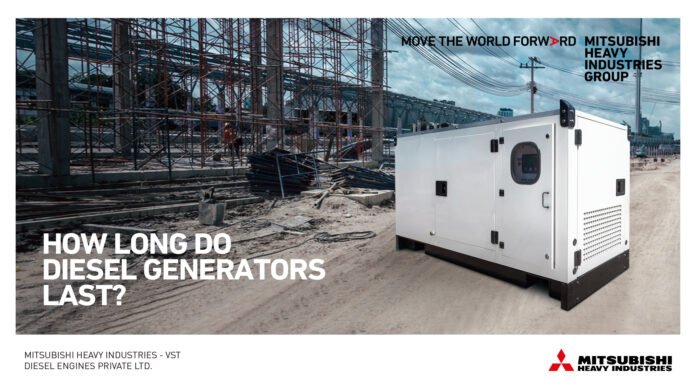Last Updated on March 4, 2024 by Nasir Hanif
In a world that thrives on continuous connectivity and uninterrupted power supply, diesel generators stand as silent sentinels, ready to kick into action when the lights go out. With their performance and their effectiveness, diesel engine generators are often the first choices of many.
Diesel generators are renowned for their durability and resilience, designed to withstand the rigors of continuous operation. These stalwart machines have been the backbone of power generation for decades, providing a reliable source of energy in both critical situations and remote locations. As businesses, hospitals, and homes depend on these powerhouses, a fundamental question arises: How long do diesel generators last? We unravel the answer and this blog, and will look into factors that contribute to their longevity.
Table of Contents
An Approximate Answer
There is no exact answer or estimation for life of diesel generators. Determining an exact lifespan for diesel generators is challenging due to various factors, but approximation estimates exist. Diesel generators, cooled by water and typically operating at 1800 RPM, often outlast standard generators, which are air-cooled and run at 3600 RPM. These diesel generators can endure a minimum of 12,000 hours and potentially reach up to 20,000 hours before necessitating engine overhauls, provided they undergo regular exercise and meticulous maintenance.
Looking deeper into the subject, the lifespan of a diesel generator can vary depending on several factors, including the quality of the generator, maintenance practices, and usage patterns. In general, well-maintained diesel generators can last for a very long time. Here are some considerations:
Quality of the Generator: High-quality generators with durable components and robust construction tend to have longer lifespans.
Maintenance: Regular and proper maintenance is crucial for extending the life of a diesel generator. This includes routine inspections, oil changes, fuel system checks, and addressing any issues promptly. Generators that undergo scheduled maintenance and repairs as needed are likely to have a longer operational life.
Usage Patterns: The frequency and duration of use can impact the lifespan of a diesel generator. Continuous heavy use may lead to more wear and tear compared to occasional or standby use.
Environmental Conditions: The operating environment plays a role in determining the lifespan. Generators operating in harsh conditions, such as extreme temperatures or high humidity, may experience more wear and require additional maintenance.
Load Levels: Running a generator consistently at its maximum capacity may contribute to faster wear and tear. Ideally, generators should be sized appropriately for the load they are expected to handle.
Technology Advancements: Newer generator models may benefit from advancements in technology and design, potentially offering improved efficiency and longevity compared to older models.
Brand and Model: The reputation of the manufacturer and the specific model of the generator can also influence its longevity. Reputable brands often produce generators with better engineering and higher-quality components.
Factors Influencing Lifespan:
There are several factors come into play when determining the lifespan of a diesel generator. Let’s explore these key elements that can significantly impact the longevity of these powerhouses.
Quality of Components:
The durability of a diesel generator heavily depends on the quality of its components. High-grade materials and superior craftsmanship contribute to a longer lifespan. Regular maintenance and timely replacement of worn-out parts can also extend the generator’s operational life.
Usage and Workload:
Like any mechanical device, the lifespan of a diesel generator is influenced by its usage and workload. Continuous operation at or near its maximum capacity can accelerate wear and tear. Generators designed for standby or emergency use typically have a longer lifespan compared to those subjected to constant heavy loads.
Maintenance Practices:
Regular maintenance is the lifeblood of any machinery, and diesel generators are no exception. Routine checks, timely oil changes, and thorough inspections can identify potential issues before they escalate, ensuring optimal performance and an extended lifespan.
Environmental Conditions:
The environment in which a diesel generator operates plays a vital role in its longevity. Generators exposed to harsh weather conditions, extreme temperatures, or high levels of humidity may experience faster deterioration. Proper housing, ventilation, and climate control can mitigate these adverse effects.
Technological Advancements:
The pace of technological advancements also impacts the lifespan of diesel generators. Modern generators often incorporate cutting-edge technologies that enhance efficiency, reduce emissions, and improve overall performance. Upgrading to newer models with advanced features can contribute to a longer operational life.
Towards The End
In the era of the need for power generation, diesel generators play a pivotal role, offering a reliable and immediate solution when the lights flicker out. While the lifespan of these stalwart machines is subject to various influences, proactive maintenance and technological advancements continue to push the boundaries of their endurance.
As industries evolve and demand for constant power supply grows, Mitsubishi diesel engine remain a steadfast choice for many applications. By understanding the factors that impact their lifespan and embracing a proactive approach to maintenance, businesses and individuals alike can ensure that these resilient powerhouses continue to serve as the heartbeat of reliable energy generation for years to come.




















